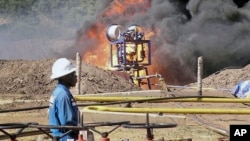Uganda has just finalized a deal to build a pipeline to Tanzania’s Tanga port, a deal that brings the country a step closer to exploiting its vast oil reserves. But gaps in land governance law could stand in the way.
In the part of western Uganda known locally as the Lake Albertine region, land grabs and evictions have become common. Disputes over the oil-rich area, which will be the starting point for the pipeline, have been the subject of increasing litigation.
There are no laws that set clear guidelines for resettlement plans or land compensation. The only guiding document is the Land Acquisition Act of 1965, and although parts of this document are still considered valid, it has often been at odds with the nation's own constitution, which was adopted in 1995.
Bashir Twesigye, executive director of Civic Response on Environment and Development, a Ugandan activist group, said the lack of clear policy means contractors will most likely have to negotiate directly with local communities.
“Are they at the level to negotiate with the contractor or the government?" Twesigye asked. "For me, this is an area where there actually needs [to be] a lot, a lot of work. Because these people are vulnerable, they are very poor and you'd not expect government to empower them to a level where they can favorably negotiate with the government.”
The government began clearing land for a refinery in the area four years ago. But land disputes on that project continue, and not all residents have been compensated yet.
The Ministry of Lands said it is trying to create a comprehensive policy on land acquisition and resettlement.
Margaret Lwanga, an environment and social management specialist with the ministry, said it's a complicated process, but one that officials hope to complete within a year or two. In the meantime, she said, resettlement will still be regulated.
Uganda lacks guidelines for helping affected people, she said, so "we are looking at using, of course, the World Bank and the international practice. What is there that we can use to formulate our policy?"
Land governance problems are compounded by a lack of high courts within the region, meaning disputes can take years to settle. During this time it's not uncommon for residents to be relegated to displaced-persons camps, which often lack adequate food and shelter. There is concern that too many displacements could lead to regional instability.







